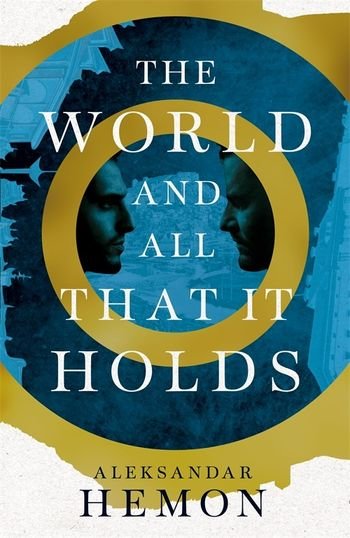The vivid intensity of both love and war are majestically captured in Aleksandar Hemon's sweeping historical novel “The World and All That It Holds”. The story begins with the assassination of Archduke Franz Ferdinand in Sarajevo, the incident which famously initiated WWI. This is witnessed by pharmacist Rafael Pinto who goes out into the streets after making a romantic overture towards a calvary officer. It's an occurrence which permanently changes the course of this poetic and fanciful man's life as thereafter he's conscripted and thrust into battle. There he meets and begins a passionate affair with fellow soldier Osman. We follow Pinto's rootless existence over multiple decades as he is nationless and desperately struggles to survive. The gritty details of conflict are paired with the ardor and enduring bond between these two men in an evocative way. These accounts are infused with Pinto's religious sensibility as a Sephardic Jew – not in a dogmatic way but which expresses the soulful feeling of this emotional individual. It's an integral part of his heritage so informs the way he frames events and the world around him. In doing so, we view this period of history through a striking new lens and witness the story of a uniquely epic romance.
The act of storytelling takes a central role in the novel. This occurs on multiple levels from Osman's charismatic ability to entrance fellow soldiers with his tales to the frame surrounding this book explained in the epilogue. Though Pinto only briefly glimpsed the shooting of Franz Ferdinand he eventually tells and retells the story so many times it acquires many dramatic flourishes. This is a natural consequence when any lived moment subsequently becomes one of historical importance. He comments “I can confirm, from personal experience, that we are always late to the history in which we live.” What might have felt random and fleeting at the time takes on a seismic meaning when we understand what followed. So we follow Pinto as he's haplessly swept into events to do with migration and civil unrest over the decades. As the burden of exile mounts he falls into despair reasoning “God was invented by the lonely people, by those who could not bear to think that no one would ever care about them, spend a thought on their loneliness. We are not chosen, what we are is terribly lonely and unloved.” Rather than faith, the only thing which prevents him from becoming completely disconsolate is his enduring loving connection to Osman and the duty he feels to care for the girl who might be Osman's daughter.
It's refreshing to gain a different view of such large scale conflicts from a point of view not often explored in historical accounts. This is especially true when it focuses on individuals without any particular political conviction who nevertheless become the casualties of war as in the novel “At Night All Blood is Black”. Hemon's novel posits that alongside the bloodshed and madness, passion was also possible. This is portrayed in the encampments where such clandestine sexual meetings between men occur as an open secret or something which is unimaginable to others. Rather than fetishising such experiences, the novel shows Pinto's fierce longing for such sensuality amidst the brutality. It seems only natural that intense encounters between soldiers might turn into loving and sustained relationships. Sebastian Barry also portrayed a same sex relationship which blossoms amidst battle in his novel “Days Without End”. Though that story came with a welcome message of hope, it's more likely true that most homosexual love affairs which occurred in such circumstances ended in tragedy. Though Hemon's novel fully embraces the likely fate of his characters it also shows how transcendence can be found in beauty and passion.








